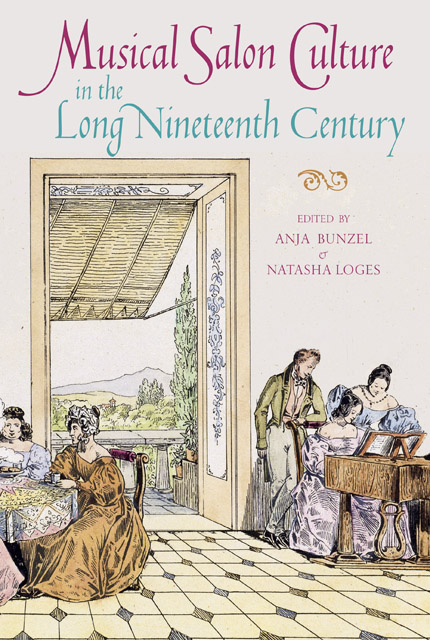Introduction
Published online by Cambridge University Press: 17 January 2023
Summary
Despite my intent to cut back a bit, we seem to have accumulated a full programme for the autumn. It is hard to say no to so many attractive and deserving requests … we have the usual mix of both the familiar and the new, with a particular highlight being the celebration of an opera anniversary on 30 November. I much look forward to receiving you into our home.
This is an extract from a recent email received by one of the editors of this volume. Although the word ‘salon’ was never used in many years of correspondence between the hosts and guests, the evenings always included live music by a mixture of professionals and proficient amateurs, framed by convivial conversation, set in a spacious, beautiful room lined with books and artworks, accompanied by light food and wine, and involving a wide social mix ranging from music students to wealthy patrons – in other words, a salon. Despite the recent rapid shift of entertainment and human interaction to the internet, this combination has lost none of its appeal, and the evenings were both well attended and greatly appreciated.
Indeed, salon-like gatherings have existed in one form or another since the symposia of Ancient Greece.3 But as with all evolving social practices, the salon resists clear-cut definitions; at its simplest, the term is synonymous with a space in a home for receiving guests (itself no straightforward description, as discussed below). However, ‘salons’ also frequently denoted formal associations of artists, writers and other members of the cultural professions, arguably the most famous of which is the Paris Salon, the annual exhibition of the Académie des Beaux-Arts. In musical composition, the word ‘salon’ in a work-title bore specific, often pejorative, stylistic connotations. Equally, many regular social events with salon-like attributes did not use that term; ‘social gathering’, ‘tea’, ‘soirée’, ‘matinée’, ‘afternoon tea’, ‘musical circle’, ‘Teeabend’ or ‘société’ abounded, and such names evoke the almost inevitable provision of food and drink, no matter how modest. More established gatherings were given distinctive, often whimsical names, like Fanny Hensel’s Sonntagsmusiken (Sunday Musicales), Johanna Kinkel’s Maikäferbund (May Beetle Association), Caroline and Wilhelmine Bardua’s Kaffeter (Coffee Club), Hedwig von Staegemann’s Donnerstag-Jugend (Thursday Youth), Marquise du Deffand’s bureau d’esprit (Room of Esprit) and Marquise de Rambouillet’s chambre bleue (Blue Room).
- Type
- Chapter
- Information
- Musical Salon Culture in the Long Nineteenth Century , pp. 1 - 10Publisher: Boydell & BrewerPrint publication year: 2019

